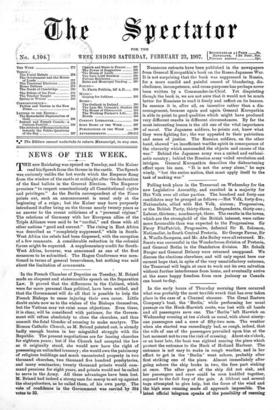Numerous extracts have been published in the newspapers from General
Kuropatkin's book on the Russo-Japanese War. It is not surprising that the book was suppressed in Russia, for a more candid and painful record of blundering, dis- obedience, incompetence, and cross•purposes has perhaps never been written by a Commander-in-Chief. Yet disquieting though the book is, we are not sure that it would not be much better for Russians to read it freely and reflect on its lessons. In essence it is, after all, an incentive rather than a dis- couragement, because again and again General Kuropatkin is able to point to good qualities which might have produced very different results in different circumstances. By far the most interesting lesson is the old one of the vital importance of moral. The Japanese soldiers, be points out, knew what they were fighting for ; the war appealed to their patriotism and sense of justice. The Russian soldiers, on the other hand, showed "an insufficient warlike spirit in consequence of the obscurity which surrounded the objects and causes of the war." Behind the Japanese army was a united and enthusi- astic country ; behind the Russian army veiled revolution and intrigue. General Kuropatkin describes the disheartening effect upon his men. "It is not the army alone," he says wisely, " but the entire nation, that must apply itself to the task of making war."










































